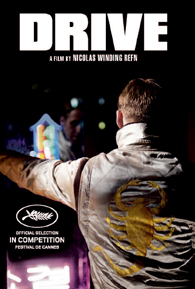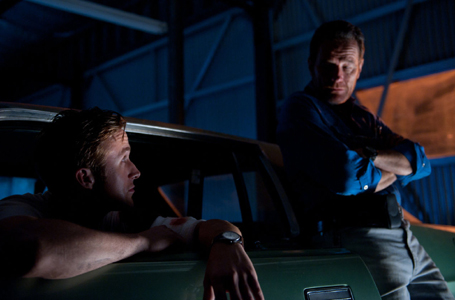
Clint Eastwood. Charles Bronson. Gary Cooper. Men of few words, but lots of action. Ryan Gosling can now add his name to their ranks with the stellar performance that he essays in Drive, Nicolas Winding Refn’s brilliant homage to 70s American thrillers, particularly the works of Walter Hill (The Driver, Streets of Fire) and Michael Winner (The Mechanic) as well as harking all the way back to that classically American artform: the Western.
Gosling inhabits superbly the role of a never-named Driver (not unlike Dwayne 'The Rock' Johnson did in Faster earlier this year) who moonlights as a getaway man for various Los Angeles criminals when he is not working in his garage or being a stuntman on various Hollywood sets. Upon helping to fix her car, he starts a quiet romance with his neighbour, the waitress Irene (Carey Mulligan), and becomes a foster father of sorts to her son Benicio in the absence of her felon husband Standard (Oscar Isaac). After a pawnshop robbery that goes horribly wrong, Driver finds himself having to defend Irene against the predations of the mob, even pitting himself against his underworld acquaintances Bernie Rose (Albert Brooks) and Nino (Ron Perlman).
Quiet, mysterious and deadly when provoked, Gosling takes the white male stoicism practiced by Gary Cooper and Clint Eastwood to the next level, adding onto it the psychosis of Scorsese's De Niro, and a distinct combination of coiled-spring menace and sudden tenderness that is all his own. The layered, nuanced, sometimes even terrifying performance does make one wonder the extent to which Gosling’s Driver is a millennial gunslinger seeking to do what's right in a lawless land or a psychotic stalker who's seen too many movies, and the cruel irony that it may not really matter.
Superb performances aid him, from rising young star Mulligan to old ham Ron Perlman and veteran chameleon Bryan Cranston (as Driver’s garage boss). Danish director Nicolas Winding Refn and cinematographer Newton Thomas Sigel create a Los Angeles as menacing as an unsettled wilderness, a place of tenuous human connection where storefronts, roads and skyscrapers stand as mute witnesses to human violence in place of high mountains and deep valleys, and a frequently mellow 70s and 80s soundtrack provides the counterpoint to the film’s harrowing mix of sustained tension and sudden brutality. Debussy said music is the space between the notes, and Refn wisely applies that advice to filmmaking by making action the intervals between the punches. The action sequences are surprisingly few, but when they arrive they erupt with deadly precision to render the audience breathless. In a time of action thrillers that are all action and no suspense, such a breath of thought and care is welcome.
Having proven both adept as a dramatic and comedic actor, Drive is the movie where Ryan Gosling jumps into the stratosphere of action superstars. Miss this film and miss cinematic history.












 列印版本
列印版本











